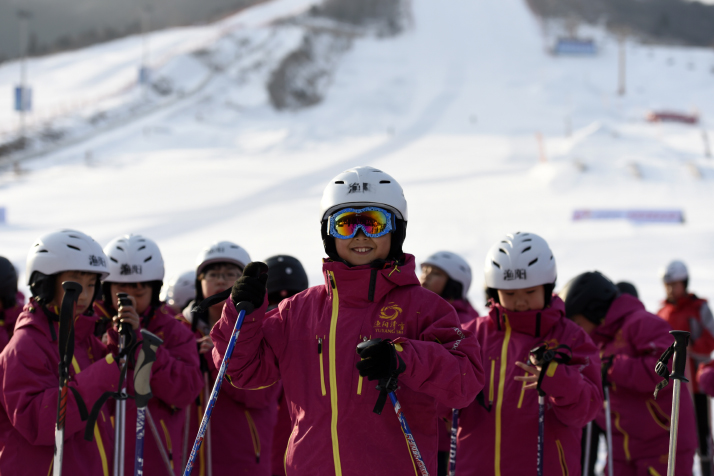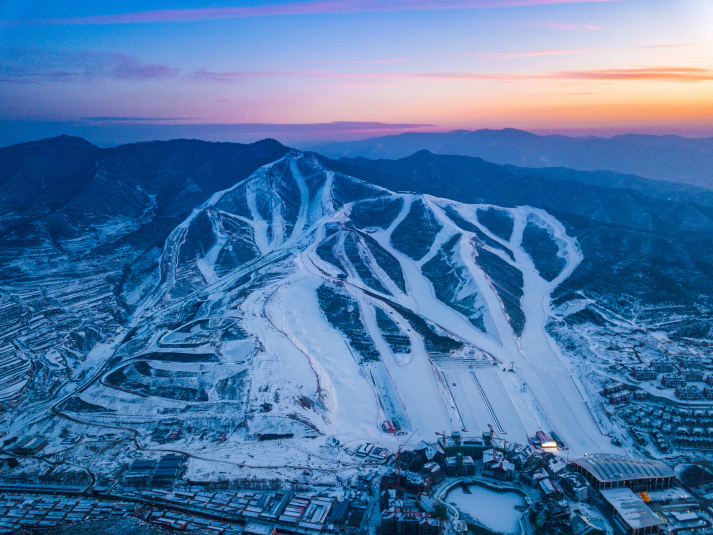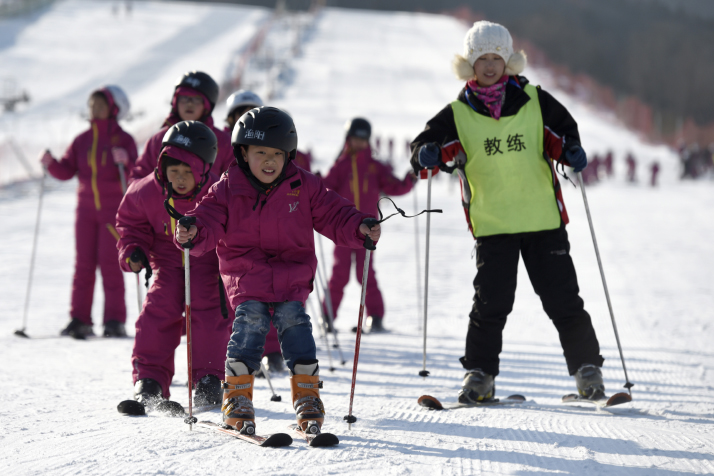|
||||||||||
| Home Nation World Business Opinion Lifestyle ChinAfrica Multimedia Columnists Documents Special Reports |
|
||||||||||
| Home Nation World Business Opinion Lifestyle ChinAfrica Multimedia Columnists Documents Special Reports |
| China |
| Snowfalls of Opportunity |
| The 2022 Winter Olympic Games has brought benefits and transformation to the bid-winning co-host city |
| By Xia Yuanyuan | VOL.10 January 2018 ·2018-01-02 |

"I clearly remembered that day. My first feeling when I heard the news was that it's a new era for my hometown now," Zhang told ChinAfrica.
On July 31, 2015, the International Olympic Committee President Thomas Bach announced that Zhangjiakou, along with the neighboring Beijing Municipality, will host the 2022 Winter Olympics.
Just as Zhang expected, his hometown has been transformed, especially Chongli, a district located north of the city where the Olympic biathlon, Nordic combined, ski jumping, snowboarding and freestyle skiing events will be held in 2022.
A successful counterattack
This is the first time Harry Gomil, a sales executive of a pharmaceutical company in Malawi, has seen and touched real snow. As a student of Beijing Normal University's international MBA program, he and his 45 classmates were invited to Chongli in November 2017 to find out how it has been transformed. It feels like being in a European town when walking in Chongli with two rows of neat bungalows stretching out along the main street and a skiing track on the mountains drifting into infinity. "I was told that Chongli was an absolutely impoverished district two years ago, which is really hard to imagine," Gomil told ChinAfrica.
Located in the transition zone of Inner Mongolia Plateau and the North China Plain, Chongli is a mountainous area receiving long periods of snowfall. The natural conditions hindered its agricultural and industrial development, leaving the area an extremely poverty-stricken and isolated inland district in Hebei Province. The 2022 Winter Olympics is changing its destiny.

"China is rolling out a national plan inspired by President Xi Jinping to encourage 300 million people to participate in winter sports and related activities by 2022. This is a good chance for Chongli District to optimize local industrial structures, increase employment and overcome poverty," said Wang Huizeng, who was deputy secretary general of Beijing Bidding Committee of 2022 Winter Olympic Games during the bidding campaigns.
Now, the district has six nationally-renowned ski resorts, with skiing trails totaling 136.6 km. Chongli received 3.5 million visitors from home and abroad in 2016, and the tourism income totaled $373 million, a growth of 27 percent year on year, according to the data released by Chongli Development and Reform Bureau. "After the successful bid for the Winter Olympics, Chongli has been receiving more and more tourists, with daily passenger flow even doubled," said Wang Cheng, President of Fulong Four Seasons, a winter tourism resort in Chongli. "Many are families from Beijing."
According to the data from Chongli Development and Reform Bureau, from 2010 to 2015, local urban resident's disposable income increased from 12,573 yuan ($1,902) to 24,098 yuan ($3,645) and rural resident's disposable income increased from 3,788 yuan ($573) to 7,695 yuan ($1,164).
Easier transportation will also help. Beijing-Zhangjiakou high-speed railway, a major transportation project for the 2022 Winter Olympics, is expected to be finished by the end of 2019. The track will boast a speed of 350 km per hour, and will take less than one hour to travel from Beijing to Chongli.
Creating jobs
The historic opportunity is also creating a large number of jobs in Chongli, specifically in skiing tourism-related industries. The arrival of a large number of tourists not only directly stimulated the consumption of accommodation, catering, transportation and other fields, but also spawned emerging industries, including ski rental services and ski equipment manufacturing and maintenance. The net result is that 20,000 residents are now working in skiing industry related jobs, accounting for 16.7 percent of the local population, according to the Tourism Administration of Chongli. At the same time, the 2022 Winter Olympics has attracted a large number of local people who work in big cities to return home to find employment or start their own businesses.
Since graduating from university in 2006, Chongli native Zhang Zhenlong has been working in an upmarket hotel in Beijing. But he decided to return to his hometown after he learned about the 2022 Winter Olympics.
"My major is hotel management. It was hard to find a suitable position before in Chongli. But now it will hold [the 2022] Winter Olympics, [and] I believe I can find a job with good salary easily in my hometown as a lot of hotels are [being] constructed, and they need professional personnel to manage international standard accommodation," said Zhang.
Speeding up urbanization

In June 2016, the Ministry of Housing and Urban-Rural Development, National Development and Reform Commission and Ministry of Finance jointly released the Notice for the Promotion of the Construction of Towns with Local Characteristics, aiming to build 1,000 towns by 2020 providing professional and distinctive facilities and services. As a village near to Chongli's ski resorts, Shangwopu Village is designed to be built as a town featuring winter tourism.
In 2016, Fulong Ski Resort started cooperation with local villagers in Shangwopo through transferring land-use rights. The company builds new houses for villagers and, in return, villagers transfer their land-use rights to the company to develop skiing tourism.
"Look at our new houses," 62-year-old Li Xiuhong, a local villager told ChinAfrica, pointing to the place where construction is taking place. "What we are now living in are old houses heated by old-fashioned coal stoves, which cause air pollution in winter. There is no place to take a bath or use indoor sanitary toilets," he added. "But now the new houses are constructed with a clean water system and clean gas stoves, and there is a sewage treatment and garbage disposal center in our new village."
"The new village was built as a scenic spot, maintaining civilian houses as tourist accommodation. With the popularity of skiing sports, more residents in big cities are willing to spend their holidays on the outskirts of the city and experience village life. Thus, developing rural tourism is an important way for poverty alleviation," said Zhang Jianchen, General Counsel of Fulong Ski Resort.
Li said he is excited about moving into his new house and plans to give up farming and open a small business to cater for the influx of tourists to Chongli.
(This article was written in collaboration with the International MBA program of Beijing Normal University)
|
||||
| About Us | Contact Us | Advertise with Us | Subscribe |
| Copyright Beijing Review All rights reserved 京ICP备08005356号-5 京公网安备110102005860号 |